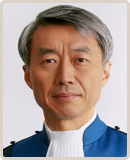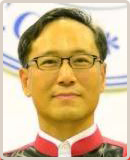International Tribunals
- Introduction
- International Presence of Korean Judges
The Supreme Court has expanded judges’ international activities in order to cultivate legal professionals with international mindset and to promote international competitiveness of the judges of Korea. Kwon, O-gon, the presiding judge of Daegu High Court, was elected as the judge of the International Criminal Tribunal for the former Yugoslavia (ICTY) in 2001. Since September 2008, the Supreme Court has sent a judge to ICTY as a research judge to let the judge be familiar with the international standards in international criminal trials. In addition, the Supreme Court seconded a judge to the Hague Conference on Private International Law (HccH) as a law officer to understand the recent trend in the area of multilateral treaty.
The Supreme Court seconded a judge to the Embassy of the Republic of Korea in the U.S. and a judge to the Embassy of the Republic of Korea in the Republic of Austria as a Legal Counsellor in February 2006 and February 2008 respectively. The secondment of a Legal Counsellor has resumed in 2013. The Supreme Court assigned a judge to the Embassy of Korea in the Netherlands in February 2013, and a judge to the Permanent Mission of the Republic of Korea to the United Nations in March 2014.
On the other hand, activities of Korean judiciary in international criminal judicial institutions are also vigorous. At the International Criminal Court, the first permanent intergovernmental tribunal to prosecute individuals for the international crimes of genocide, crimes against humanity, and war crimes, Song, Sang-hyun, the former president of the ICC had served as a judge and president for 12 years since he was appointed as the first judge in 2003. Currently, Chung, Chang-ho, a presiding judge of Seoul Central District Court, is serving as the ICC judge since March 2015 after he was elected as the judge of the ICC in December 2014.
In addition, Baik, Kang Jin, a judge of Seoul High Court, was elected as a judge of Pre-trial Chamber at the Extraordinary Chambers in the Courts of Cambodia(ECCC) in June 2015. The ECCC is an international tribunal established in 2005, in accordance with the agreement between Cambodian government and the UN, in order to prosecute the senior leaders of the Khmer Rouge for critical crimes including genocide occurred under the Khmer Rouge regime in Cambodia. Judge Chung, Chang-ho served from 2011 to February 2015 at the ECCC.
Judge KWON O-gon
Former United Nations Judge at the International Criminal Tribunal for the former Yugoslavia
Former United Nations Judge at the International Criminal Tribunal for the former Yugoslavia

In November 2001, former Judge KWON O-gon, then presiding judge of the Daegu High Court, was elected as a permanent judge of the International Criminal Tribunal for the former Yugoslavia (ICTY). He became the first Korean judge to serve on an international tribunal. From 2008 to 2011, he also served as Vice President of the ICTY. The tribunal, the first of its kind since the Nuremberg Trials and the Tokyo War Crimes Trials, was established to prosecute serious crimes such as genocide and crimes against humanity committed in the territory of the former Yugoslavia.
From 2002 to 2006, Judge Kwon sat on the trial of Slobodan Milosevic, former president of the Republic of Serbia and the Federal Republic of Yugoslavia, who faced charges including forced migration, rape, and genocide. Beginning in 2009, he presided over the trial of Radovan Karadzic, the former Bosnian Serb leader held responsible for commanding the genocide of Croats and Muslims during the Bosnian Civil War. The Karadzic case became one of the largest and most complex in the ICTY’s history, involving 600 witnesses, 11,500 exhibits, and more than 300,000 pages of disclosed material.
Judge Kwon retired from the ICTY on March 31, 2016. During his tenure, he played a crucial role in advancing international justice and promoting global peace. Through the ICTY trials, he contributed to the development of both substantive and procedural international customary law. At a time when no precedents existed for international criminal trials, Judge Kwon was instrumental in bringing to justice individuals responsible for crimes against humanity and war crimes.

Former Judge CHUNG Chang-ho, then the presiding judge of the Busan High Court, served as a United Nations judge at the Extraordinary Chambers in the Courts of Cambodia (ECCC) from August 2011 to February 2015. During his tenure, he played a significant role in the ECCC’s efforts to deliver justice both internationally and within Cambodia by prosecuting crimes against humanity committed by the leaders of the Khmer Rouge.
After his esteemed service at the ECCC, Judge Chung was elected to the International Criminal Court (ICC) during the 13th Assembly of State Parties, held at United Nations Headquarters in New York in December 2014. His appointment made him the second Korean judge to serve at the ICC, following former ICC President Song Sang-hyun. The ICC is the first permanent international tribunal established to prosecute genocide, crimes against humanity, and war crimes.
Judge Chung's nine-year term at the ICC began in March 2015 and concluded in 2024. Throughout this period, he played an invaluable role in the Court’s work and advancing the international standing of the Korean judiciary.

Presiding Judge BAIK Kang-jin of Seoul High Court was appointed as a United Nations judge to the Extraordinary Chambers in the Courts of Cambodia (ECCC) in July 2015, succeeding Judge CHUNG Chang-ho. The ECCC, established in 2005 by a bilateral agreement between the United Nations and Cambodia, was mandated to prosecute crimes such as genocide committed under the Khmer Rouge regime from April 1975 to January 1979. Judge Baik served on the Pre-Trial Chamber, which settles disputes arising during investigations at the ECCC, as part of the tribunal’s two-instance system.
During his tenure, Judge Baik made significant contributions to the advancement of international criminal justice and further demonstrated the excellence of Korean judges on the global stage.



